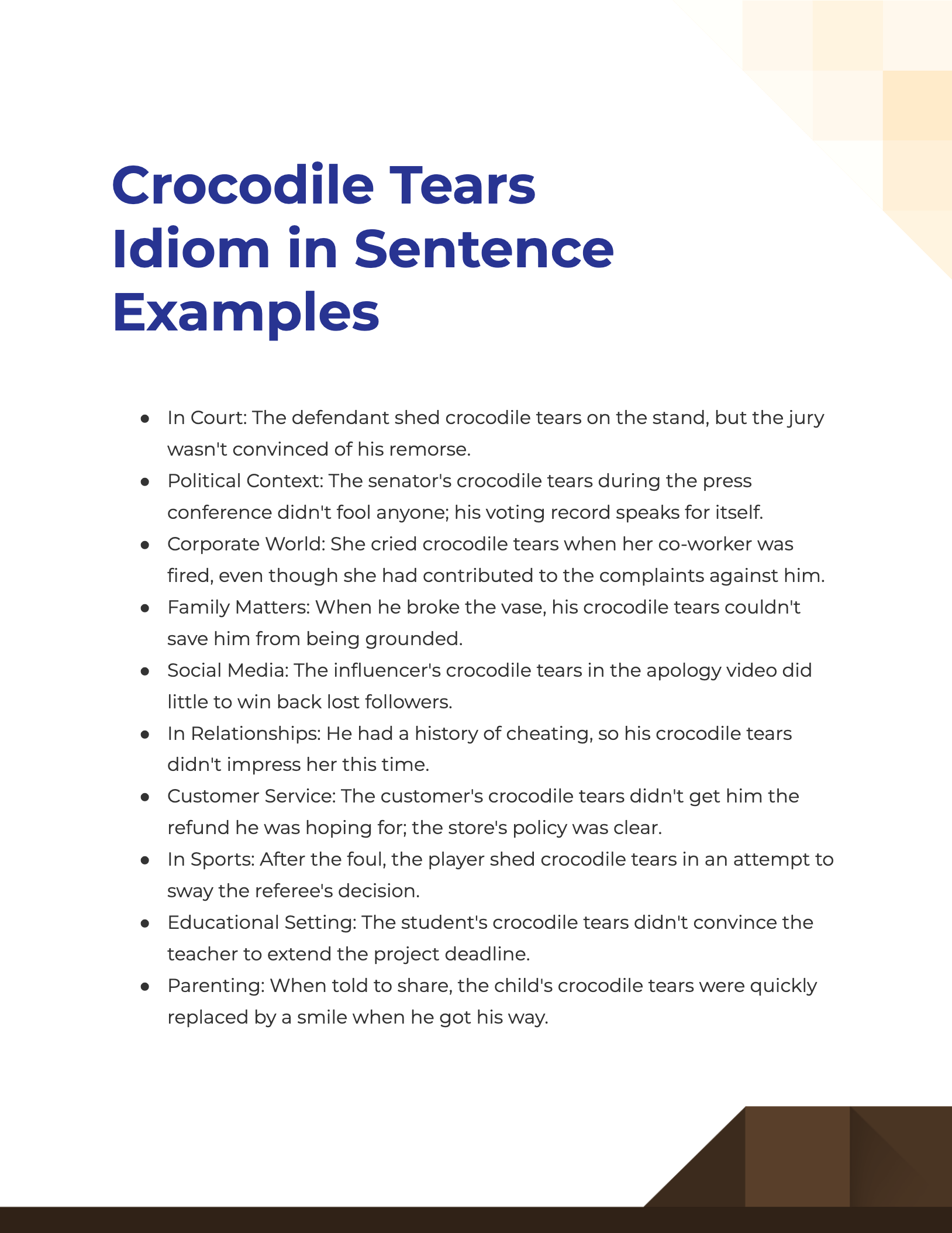19+ Crocodile Tears Idiom Examples
Uncover the captivating nuances of the “Crocodile Tears” idiom with our comprehensive guide. Learn its intriguing meaning, delve into vivid sentence examples, and grasp how to effectively use this fascinating expression in daily life. Ideal for language enthusiasts and those looking to improve their communicative skills, our guide helps you decipher the true intent behind those seemingly sorrowful eyes. Unlock the power of understanding “Crocodile Tears” and add a new layer to your linguistic prowess.
What is Crocodile Tears Idiom? – Definition
The idiom “Crocodile Tears” refers to expressions of sorrow or distress that are insincere or fake. It is used to describe someone who is pretending to be sad or upset but is not genuinely feeling those emotions.
What is the Meaning of Crocodile Tears Idiom?
The term “Crocodile Tears” has its origins in an old belief that crocodiles weep while eating their prey. According to the myth, the crocodile’s tears were seen as an insincere show of emotion. While the crocodile appeared to be sad, it was, in reality, enjoying its meal. In the same way, when someone is said to be shedding “crocodile tears,” they are feigning sorrow or distress to deceive others. It can be used in various situations, such as during arguments, debates, or when someone wants to gain sympathy or avoid blame. The idiom serves as a skeptical or critical remark to question the authenticity of someone’s emotions.
Origin of Crocodile Tears Idiom
The phrase “crocodile tears” has a rich historical background and dates back to medieval times. One of the earliest mentions can be found in the works of Sir John Mandeville in the 14th century, where he described crocodiles as cunning creatures that wept to lure their prey. Over time, the idiom has become a popular expression in the English language, symbolizing insincere emotions or deceptive behavior.
The myth surrounding crocodiles weeping while eating has been debunked by modern science. However, the idiom remains a powerful tool for describing feigned emotions and continues to be widely used in both formal and informal settings.
20 Unique Sentence Examples Using the Idiom “Crocodile Tears”

- In Court: The defendant shed crocodile tears on the stand, but the jury wasn’t convinced of his remorse.
- Political Context: The senator’s crocodile tears during the press conference didn’t fool anyone; his voting record speaks for itself.
- Corporate World: She cried crocodile tears when her co-worker was fired, even though she had contributed to the complaints against him.
- Family Matters: When he broke the vase, his crocodile tears couldn’t save him from being grounded.
- Social Media: The influencer’s crocodile tears in the apology video did little to win back lost followers.
- In Relationships: He had a history of cheating, so his crocodile tears didn’t impress her this time.
- Customer Service: The customer’s crocodile tears didn’t get him the refund he was hoping for; the store’s policy was clear.
- In Sports: After the foul, the player shed crocodile tears in an attempt to sway the referee’s decision.
- Educational Setting: The student’s crocodile tears didn’t convince the teacher to extend the project deadline.
- Parenting: When told to share, the child’s crocodile tears were quickly replaced by a smile when he got his way.
- Literature: The villain’s crocodile tears in the final chapter were a stark contrast to his earlier ruthlessness.
- Reality TV: Her crocodile tears during the elimination round were clearly aimed at gaining sympathy votes.
- Healthcare: The doctor wasn’t moved by the patient’s crocodile tears and insisted on further tests.
- Journalism: The CEO’s crocodile tears during the interview about layoffs left employees even more skeptical.
- Legal Contracts: His crocodile tears didn’t absolve him from the clear terms and conditions he had violated.
- Animal Welfare: The activist’s crocodile tears about animal rights seemed less genuine given her leather handbag.
- Community Issues: The councilman’s crocodile tears about the community center’s closure didn’t match his previous actions.
- Job Interviews: Despite her crocodile tears, the hiring manager was not convinced of her passion for the job.
- Financial World: His crocodile tears about market fluctuations seemed insincere given his aggressive investment strategies.
- Friendships: Her crocodile tears were not enough to mend the friendship she had knowingly sabotaged.
These examples capture a broad range of scenarios where the idiom “crocodile tears” can be effectively used to depict insincerity or deception. Whether you’re looking to add nuance to a story or make a point in a debate, this phrase offers a compelling way to question the genuineness of someone’s emotions.
More Famous Idioms with Meaning, Sentence Examples
- Play It by Ear Idiom
- In Black and White Idiom
- Full of Beans Idiom
- Busy as a Bee Idiom
- Snake in the Grass Idiom
- Once in a blue moon
- Break a leg Idiom
- Beat around the bush Idiom
- Bite the bullet Idiom
- Through thick and thin Idiom
- Actions speak louder than words Idiom
- Go down in flames Idiom
- Jump on the bandwagon Idiom
- Call it a day Idiom
- It takes two to tango Idiom
- A blessing in disguise Idiom
- Come rain or shine Idiom
- On cloud nine Idiom
- Better late than never Idiom
- Hit the sack Idiom
- Go the extra mile Idiom
- The Whole Nine Yards Idiom
- A penny for your thoughts Idiom
- Pull someone’s leg Idiom
- As right as rain Idiom
- Ignorance is bliss Idiom
- Throw caution to the wind Idiom
- Kick the bucket Idiom
- Take a rain check Idiom
How to Use Crocodile Tears Idiom in Sentences?
Understanding the appropriate contexts for using the idiom “Crocodile Tears” can add depth and nuance to your language skills. Here’s how to effectively incorporate this expression in various types of sentences:
In Statements
- Affirmative: “He was showing crocodile tears when he heard about the budget cuts.”
- Negative: “I don’t think those are crocodile tears; she seems genuinely upset.”
In Questions
- Direct: “Do you think she’s crying crocodile tears?”
- Indirect: “I wonder if his regret is real or just crocodile tears.”
As an Adjective
- “Her crocodile-tears apology was far from convincing.”
In Conditional Sentences
- “If you believe those are crocodile tears, then you’re more naive than I thought.”
Combining with Other Idioms or Phrases
- “She cried wolf too many times, and now even her crocodile tears won’t save her.”
In Complex Sentences
- “Though she wept openly, her colleagues suspected they were just crocodile tears because she had wanted the same promotion.”
Tips for Using Crocodile Tears Idiom
Know Your Audience
While the phrase is commonly used, it’s critical to be aware of your audience. In formal or sensitive situations, opting for a less idiomatic expression might be more suitable.
Context is Key
The idiom is generally used to express skepticism or disbelief about someone’s emotional sincerity. Make sure the context supports this sentiment before you employ the phrase.
Timing
Timing can greatly impact the effectiveness of using this idiom. Use it when the emotional display in question is ongoing or has recently occurred to achieve the most impact.
Pair with Evidence
If you’re accusing someone of shedding crocodile tears, it’s powerful to pair the idiom with evidence or reasoning that supports your claim. This could be past behavior, contradicting facts, or logical deductions.
Be Mindful of Tone
The expression inherently accuses someone of deceit, so consider the tone and implications. Use it cautiously, especially in sensitive or confrontational situations, to avoid unnecessary conflicts.
Experiment with Sentence Structure
The idiom is versatile enough to be used in various positions within a sentence. You can start with it, end with it, or incorporate it into the middle of your statement.
By mastering the use of “Crocodile Tears,” you can effectively convey skepticism about someone’s emotional genuineness in an impactful manner. This understanding will enhance both your written and spoken English, enabling you to communicate more expressively and persuasively.



